 What kinds of cards will you see in Eternal?
What kinds of cards will you see in Eternal?
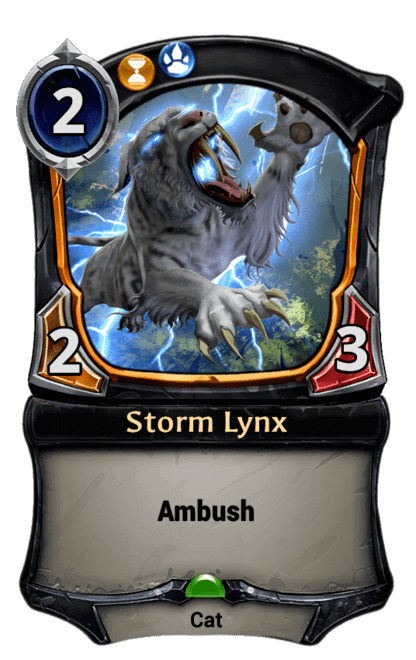 The main card types are power, unit, spell, relic, weapon, and curse. Units have subtypes and rather than display the word 'unit' on them, they display only their "creature type." Normal spells work like sorceries, and fast spells (fast is a modifier type or supertype) work like instants. The dev team apparently decided against applying fast to other card types, as "flash creatures" get a keyword—ambush—that allows them to be cast out of turn.
The main card types are power, unit, spell, relic, weapon, and curse. Units have subtypes and rather than display the word 'unit' on them, they display only their "creature type." Normal spells work like sorceries, and fast spells (fast is a modifier type or supertype) work like instants. The dev team apparently decided against applying fast to other card types, as "flash creatures" get a keyword—ambush—that allows them to be cast out of turn.While we're on the subject, fast spells and units with ambush can't be played as freely as in Magic: You can ambush only before declaring blockers when attacked or at the end of your opponent's turn. You can cast a fast spell in the same two instances, or in response to an opponent targeting one of your units. I think. I'm not 100% clear on that, because the official rules aren't public, and sometimes I can respond to things and sometimes I can't.
It's disappointing that units can't just be fast because that would be so elegant. That's clearly a result of the choice not to print the word 'unit' on units. "Fast Unit—Cat" would be one thing, but "Fast Cat" is confusing because it's mixing supertypes and subtypes. That doesn't matter right now, but it likely will eventually.
Relics take up the role of global artifacts and enchantments. They are 'permanents' that don't fight. They have static effects, triggered effects, and/or activated abilities. Like all non-power cards, most have faction requirements, but some don't. Combining those two card types costs us a bit of flavor but simplifies things considerably.
Ultimate, as seen on Crown of Authority is an activated ability you can only use once while that card is in play. It's like monstrosity, but only some ultimates boost their unit's size.
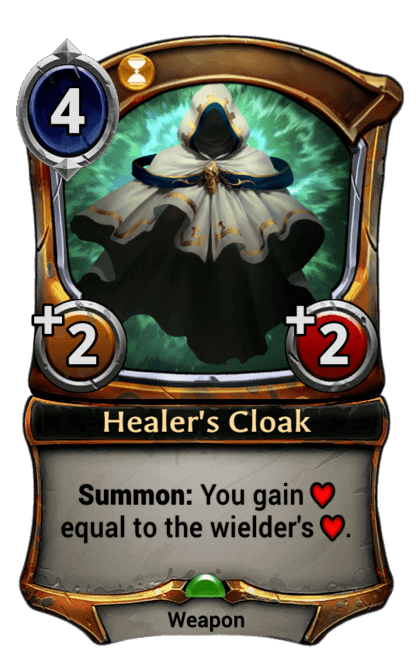
Weapons work exactly like auras. The vast majority of weapons increase power and toughness. Or attack and health. Or sword and heart. I don't actually know what the term for those stats are, as they are never referenced verbally. When both are being adjusted, you see the old familiar +X/+Y and when just one or the other is being referenced, you see a sword or a heart icon.
Summon is the keyword for "When this card enters play." Eternal takes every opportunity to collapse common phrases into keywords. This is partially motivated by the need to keep text short so it fits on small screens.Relic Weapons are different. They're weapons that you attach to yourself, allowing you to attack separately from any units you may or may not have. You might notice that the color of the number on the right is purple for relic weapons where it's red for units or non-relic weapons. That's because a relic weapon doesn't increase your life/health/hearts, it increases your shields. Shields work like hearts, but are lost first (and presumably if you found a way to have 0 hearts and 5 shields, you'd still lose). The reason shields matter is that you lose all your relic weapons when your shields are reduced to 0.
If you've got just a Miner's Musket, you'll lose it as soon as the enemy deals 1 damage to you. If something increases your shields while you have a relic weapon, though, like Shield Bash, that increases its durability. I've just learned you can only have on relic weapon at time, and that playing a new one will reset your shields; that's an example of where Eternal fails to teach its rules well.
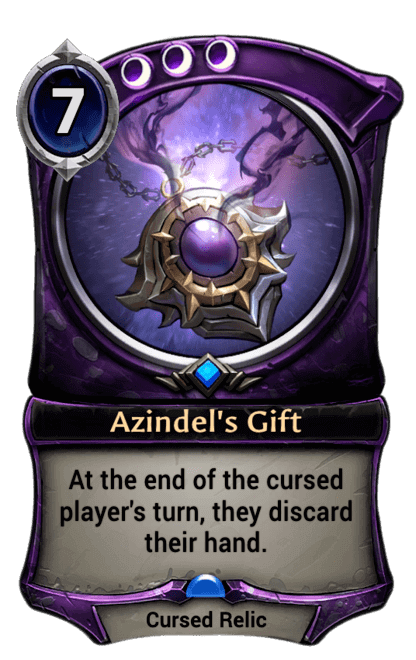 Finally, there are curses. A curse is also an aura, but where weapons are played on your own units, curses are played on your opponents'. A cursed relic is an aura that you play on your opponent themself. I'm not entirely sure whether you can choose to play a weapon on an opposing unit or a curse on one of your own or if the game prevents that entirely. Differentiating these card types allows you to make cards that care about curses and not weapons, and vice-versa.
Finally, there are curses. A curse is also an aura, but where weapons are played on your own units, curses are played on your opponents'. A cursed relic is an aura that you play on your opponent themself. I'm not entirely sure whether you can choose to play a weapon on an opposing unit or a curse on one of your own or if the game prevents that entirely. Differentiating these card types allows you to make cards that care about curses and not weapons, and vice-versa.You'll never see it printed as a card's type, but relics, weapons and curses all fall under the umbrella of attachment, which effects mostly punish.
Tribal's not a thing, because why would your port over a hack.
Planeswalkers aren't a thing. Yet? It's impossible to know whether Dire Wolf Digital is planning on introducing the equivalent of 'walkers later, or have decided that they're not a fit for the game. Given the faithfulness of this game's reinterpretation, and the popularity of planeswalkers, I'm guessing they're just saving them for later.
There's a hint that Eternal will introduce heroes, somehow analogous to legends, but I haven't seen any yet and they don't have any mechanical significance so far.
If you'd like to browse some cards, try Eternal Warcy or Numot Gaming.
Part I - Part II - Part III - Part IV

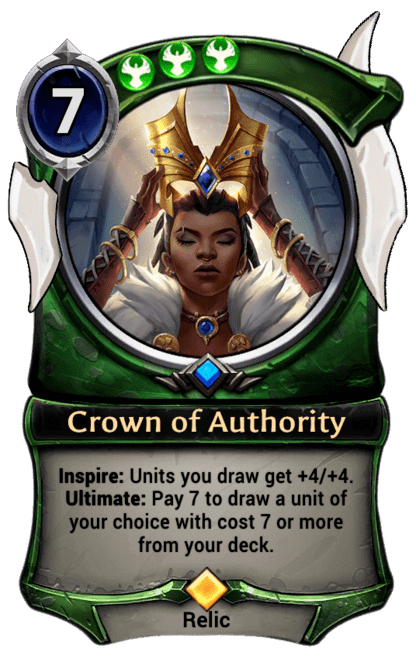
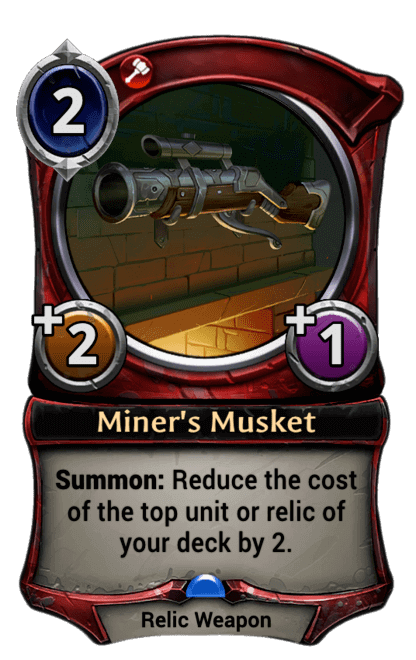
It's not actually true that playing two Miner's Muskets would get you 2 armor, you can only have one relic weapon at a time, and playing when you lose one, including by replacing it with another, you lose all your armor with it.
ReplyDeleteGah! I didn't know you could only have one relic weapon at a time. That's a serious gotcha!
DeleteI'll update the post. Thanks, Jade.
There are a lot of weird rules with Relic weapons that you only figure out after you play Armory for a long while. Like if I have a 3/2 weapon, take one damage, and gain three armor, and then they destroy the weapon, what will the weapon be in my discard pile if I bring it back with a Reforge?
DeleteWhat if I attack with my 3/2 weapon and then play a Starsteel Diasho? Eternal (like many other digital card games) gets away with short rules textboxes because the game just won't let you do something you can't do, so you don't always need to know how something will work in advance, as long as it, well, works.
Relic Weapons are a lot like Planeswalkers, right? Persistent, card advantage effects. Shields as Loyality counters.
ReplyDeleteMusket, Gun for Hire 1R
Legendary Planeswalker Musket
When Musket enters the battlefield, create two Gold tokens
+0: Deal 2 damage to any target
[1]
You could try to emulate them by making a weird Planeswalker like the above, but the functionality of Relic Weapons and the functionality of how Planewalkers are actually designed are quite different.
DeleteThe cards are designed differently, but the game play is similar. Relic Weapons typically provide spell like effects and a bit of a life buffer. Unlike Magic, Eternal forces you to attack a walker rather than choosing. I think many of Eternals design choices default to the "normally correct" Magic choice rather than giving options, which helps new players at the expense of some strategic options.
DeleteSome relic weapons provide a spell effect, but I wouldn't say most. It is the same way a lot of creatures have ETB abilities, because otherwise you have a lot of cards that look the same aside from minor number variations.
DeleteStaff of Stories is pretty literally a planeswalker. Auric Runehammer and Sword of the Sky King are much less so.
Dealing damage is a spell like ability, right?
DeleteAuric, Runehammer RRGG
Legendary Planeswalker Auric
0: Deal 4 damage to target player
0: Deal 4 damage to target creature. Activate this ability only the first turn Auric enters the battlefield
-1: Deal 4 damage to target creature. It deals damage equal to power minus 1 to you.
[1]
Another interesting property of Relic Weapons is the fact that your spells gain the Keywords the weapon has. This almost never happens except in the puzzles, but if you are wielding The Last Word, your burn spells gain Deadly/Deathtouch was well.
DeleteThat's a wild rule to not have spelled out on the card! Also, The Last Word is Super Planeswalkery, it's even got a game winning Ultimate!
DeleteRelic Weapons fill the same role that Vanguard avaters were meant to fill: Giving the player an in-character presence in the game as the wizard/walker behind all the magic being done.
DeletePlaneswalkers eventually came along to address this need from another angle: Giving the protagonists of the story an impactful presence in the game.
Relic weapons aren't as unique as avatars and nowhere near as unique, varied, or powerful as planeswalkers, but I agree they are serving a similar role for the game's experience and that they also have some similarities in gameplay.
Oh yeah. Flavor wise they do very different things. Mechanically, they provide a life buffer, an incentive for opponents to attack, pressure decks heavy with creature removal, and provide a source of recurring card advantage. These are also the main features of planeswalkers. Vanguard cards provided variable player powers and build around effects. Because of the way they began the game in play, they're really more like Avatar abilities in Hearthstone than anything currently in Eternal.
DeleteI agree with you entirely about the poor way that the game is taught. Many of the more subtle intricacies are learned by doing the puzzles, but even then the player must actually be able to deduce the way works. I dont find this useful for player with zero CCG experience. Even then there are many things not explained. For example, did you know that in combat, if both players have Fast spells, they both have priority simultaneously? This means that Player A attacks, then Player B makes a block, then BOTH players can cast their removal / combat tricks at the same time. So the more experienced players wait for a moment until their opponent plays their spell first to blow him out. This is so unituitive for me.
ReplyDeleteFWIW, I'm a fan of the videogame model of learning-by-doing; but to offer that alone with no official reference is a Mistake.
DeleteSeriously? Incentivizing players to slow the game down is a bad call.